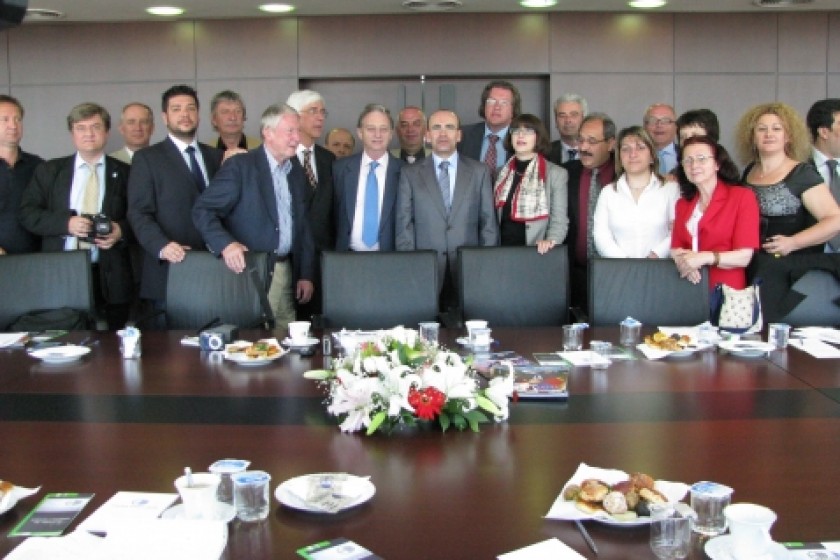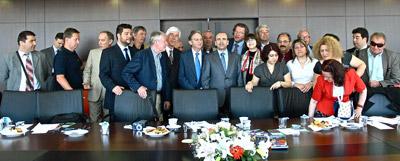
Turkey’s Minister of Finance also Talks about Preconditions Regarding Armenian-Turkish Relations
Minister Şimşek believes the only standard for Turkey’s accession to the European Union should be its desire to become a nation of European values
On May 13, 2009, in the Turkish capital of Ankara, eighteen members of the Association of European Journalists, including a correspondent from “Hetq”, met with Mehmet Şimşek, Turkey’s Minister of Finance.
The minister’s speech mainly dealt with the global economic crisis and its impact on Turkey. While stressing that his country hasn’t particularly suffered from the crisis, the minister pointed to three sectors that have registered negative numbers – commerce-a decrease in exports and a rise in imports, automobile production and consumer credit. According to the minister, the Turkish banking system is stable and has registered 19% profit margins as of 2008. The Turkish finance minister mostly painted a rosy picture of the Turkish economy to the reporters – positive macroeconomic numbers, low inflation rates, etc. In comparison, regular citizens and Turkish reporters were talking about high levels of unemployment.  After the minister’s speech, reporters were allowed to ask questions. What follows are those questions that we think will interest readers in Armenia.
After the minister’s speech, reporters were allowed to ask questions. What follows are those questions that we think will interest readers in Armenia. 
-Why does Turkey wish to become a member in the EU?
-Turkey’s EU accessing process is essentially Turkey’s modernization process. The European Union, in my opinion, should be proud for having the economic, political and social engine of transformation in Eastern and Central Europe and to some extend, in Turkey. The only thing we want from European leaders and the European Union is to allow its accession process to be the engine, to remain the engine of this transformation for Turkey, as well. So, for us the journey to European Union is more relevant, more meaningful, and more significant than mere membership. We will not accept any other offer other than membership. Europe needs Turkey, and yes, we need Europe. We need a long-term outlook. I’ve picked up a copy of Spectator a British magazine. I know it’s funny, but they were saying that by the end of this millennium, if the fertility rates remain as they are, there will be 500 people living in Europe. We are very young country. We are an extremely dynamic economy. You know, we are very critical in terms of many issues. If Europe wishes to see the existing problems in Turkey quickly resolved then it must keep Turkey at its side. If Europe is genuinely interested in energy supply security then it needs Turkey. If Europe is genuinely sincerely interested in dialog between West and East, wouldn’t this be the best way to show such interest? We don’t need European money. We will be positively contributing to European budget. Today, Turkey is the sixth largest economy in Europe. If you look at the last 50 years, they have been dismal. Why? - Because, as we know, there is a problem of political stability. That’s what the EU is all about. If we can all get together and all EU process will change. What would Europe lose, if it allows Turkey to continue its accession process, transform its legal system, transform its institutional infrastructure and catch up with Europe? The European Parliamentary elections around the corner and some European leaders, not all, want to use the issue of Turkey’s membership for domestic political purposes. I understand why that is being done. The problem is European transformation process is not easy. Change is never easy. And you need public support to do so. We can implement these reforms. But I think with Europe, with European backing, it’s more structured, it’s more systematic, and it’s more durable, because we have a complex history and complex political system. And, so, what we ask of our European friends is not much: just let us use the European Union vision to continue, to create a more democratic, a more prosperous and a secular society in this country. Yes, we may have difficulties, we may have different cultures, religion, but we wish to share common values with our European friends. And I think that should be the only standard. We are not perfect. This country is not perfect. We have a lot of things to do, to create a more tolerant, a more democratic, and a modern and prosperous society. There is a long way to go.
-The French president spoke about the Mediterranean Union. Are you opposed to this and does membership in the Mediterranean union and not in European Union pose a problem for you?
-Absolutely not. We want first class membership. The final decision will be that of the European and Turkish peoples. Maybe the Turkish people, x years from now, they will say, “Well, you know, we have a first rate democracy, we have got first rate economy, first rate institutions. Why do we need to join European Union?” What I mean to say is that further cooperation in Mediterranean region is a great thing, but we do not see it as an alternative to Turkey’s EU aspirations.
-Do you think that Turkey can be EU member with closed border with its neighbor? What are Turkey’s expectations from a border opening with Armenia because although there are no diplomatic relations there are however commercial relations between Turkey and Armenia.
-I don’t think we can expect EU membership with these types of issues. Hopefully, such issues will be resolved whether there is EU or not. In some ways the European Union, although initially an economic union, has now gone beyond that. Thus, in some ways, it’s a roadmap leading to peace. Even though the border is closed, we have about 70.000 people from Armenia in Istanbul and other big towns who come to work in this country. Yes, we have historical issues and there is one thing that needs to be addressed. However, I think that if today Armenia and Azerbaijan can jointly formulate a road map as to how they will solve the conflict it would make it much easier for us.
-There are deputies in the European Parliament that have been stating for the past ten years that, “Well, we are in favor of Turkey’s membership, but in Turkey there are some things that can’t be changed overnight.” When there is discussion about the economy, the financial crisis, we all agree that transformation will take a long time. But there are other questions regarding freedom of religion, freedom of speech, press freedom and other such issues. And the Europeans are saying that Turkey should be moving much faster than it is now.
-They have been occasions when it looks like things are not moving. Let’s put it this way. Change in countries like Turkey is very complicated.
-Why?
-For Eastern Europeans coming out of communism the road leading to Europe was much easier and many things could change in those countries within a short period of time. This country is built on Ottoman ruins. It has had a complex history for the past 300 years, rife with fears. Here I refer to our fears for it’s not only Europeans that have fears. On the top of all these we also have strong forces in this country who want to maintain status-quo and forces who want to change only gradually. I agree with our European friends that gradualism is not the way forward. I think that this is the case when it comes to economic as well as political issues. There’s a man at the Carnegie Center in Washington D.C. who wrote a book after serving as an advisor in Eastern Europe for many years. I remember that book. In it, he examines the experience of 27 post-Soviet countries. It tries to come up with the real reasons why some countries have succeeded and some have failed. It attempts to explain why Belarus remained Belarus, contrary to the case in Poland. The author presents 2-3 simple factors. One of them is the pace of change. Do you adapt a gradualist approach or do you believe in radical, top to bottom change. As I have said, we have problems. Turkey has a complicated domestic political system and there are other problems as well. But change is happening. My mother and my father couldn’t read and write; they were illiterate. They couldn’t speak a word of Turkish. I couldn’t speak a word in Turkish. (The minister is of Kurdish origin – L.S.) If they told me fifteen years ago that Turkey would be seeing the initiatives that we have today - a 24-hour broadcasting in Kurdish language - I would have told them they were crazy to harbor such expectations. This complicated history, these complicated structures and outstanding problems with our neighbors, aren’t merely excuses I do agree with my European friends that everything should proceed much faster but I am simply explaining why things are the way they are.
-I want a comment about the statements made by Sarkozy and Merkel who said that we can’t accept another country in European Union and we can’t accept Turkey as a full member but we can give Turkey all the privileges. Why don’t you accept this? Some members of the European Parliament say that only a small part of Turkey is Europe. The other larger part is in Asia. Why do you want to become a full member? Secondly, we know that our national bank cooperates with Turkey and especially with finance bank. Tell us about this cooperation and if there are other Greek businessmen in Turkey.
-First, let’s discuss privileged membership. Even those who talk about privileged membership have not been able describe what privileged membership is. We have been a full member of European Union Consumers Union since 1996. So, all the good produced in Turkey are exported to Europe tax free. All the goods from Europe are exported to Turkey tax free. That’s what privileged membership means. In terms of Turkey not being in Europe, to be honest with you, I am not sure whether Cyprus is East of Ankara or not when we look at map. So, really this is not about physical location. This is about corresponding common values. Regarding economic relations with Greece, things have been improving very fast. We obviously welcome any European Union business in Turkey. And in fact 80 % of foreign direct investments that Turkey has attracted over the last 3-4 years have been of European Union origin.
 Videos
Videos Photos
Photos
Write a comment